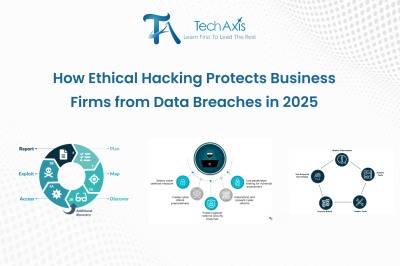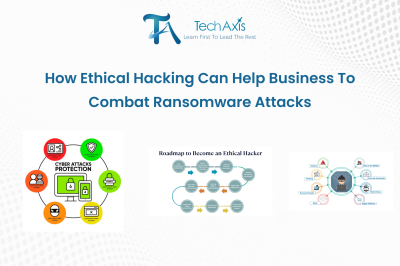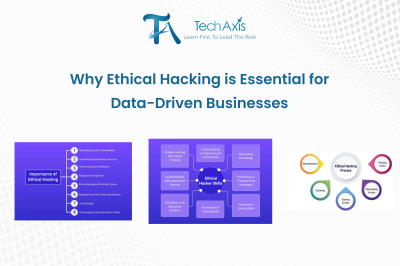Course overview
The Ethical Hacking Training by TechAxis is a comprehensive, practical course on technical concepts necessary for ethical hacking. The goals of our curriculum centre around giving you the knowledge of what constitutes a threat in cybersecurity and how to evaluate them within the boundaries of ethical hacking and penetration testing.
As a student, you will get to know different hacking methods, hacking tools, and the right tactics to protect a system and a network. Topics to be discussed in the course include, but are not limited to network security, cryptography, penetration testing, malware analysis, and risk management. You also learn how attackers work and therefore it’s easier to put on a hacker mindset in a bid to prevent such attacks.
Scope of Ethical Hacking in Nepal
Ethical hacking has been focused widely in Nepal due to the recent advances in Information Technology use and the rise of cybercrimes. Because of the increased adoption of technology in business, organizations and government agencies, there is an increased need for people with cybersecurity skills to protect information. Ethical hackers are employed to test an organization’s system to conceal weakness so that evil-minded hackers are unable to access it hence the demands.
The Nepali IT and technologies industry is gradually expanding over time, seeing growth in new startups, online businesses and many other digital services. Given the rising complexity of threats within cyberspace, job opportunities for ethical hackers have grown rapidly in the banking, telecom, health care, and government sectors. Besides, due to increased attention to cybersecurity and the government's drive to digitalization, there are plenty of vigorous opportunities for ethical hackers.
Given the growing cybersecurity threats across the world, there are good employment prospects and more significantly, well-paid jobs for ethical hackers in Nepal.
Why Ethical Hacking Training Course in Nepal?
As the world becomes increasingly digital, the importance of securing sensitive information and preventing cyber threats has never been greater. Ethical hacking is a sought-after skill, empowering professionals to identify vulnerabilities and safeguard systems proactively. Here's why investing in an Ethical Hacking Training Course in Nepal can be a game-changer for your career:
Key Features and Benefits of Ethical Hacking
- Proactive Security Measures, Enhanced Protection: Ethical hacking equips you with the tools and techniques to uncover potential security loopholes before malicious actors exploit them. By learning ethical practices like penetration testing, vulnerability assessments, and system hardening, you help organizations build robust defences against cyberattacks.
- Cost Savings Through Preventive Action: Addressing security issues early is far more cost-effective than dealing with the aftermath of a breach. Ethical hacking helps organizations avoid devastating financial and reputational losses. Your expertise becomes instrumental in identifying risks and preventing damage, saving companies both time and resources.
- Collaboration Across Teams: Ethical hacking bridges the gap between IT teams, security professionals, and decision-makers. By understanding the language of cybersecurity, you can foster collaboration across departments, ensuring everyone is aligned to tackle threats effectively.
- Increased Employability and Career Growth: With the surge in cybercrimes globally, the demand for ethical hackers is at an all-time high. Completing an Ethical Hacking Training Course not only sharpens your technical skills but also enhances your credibility with Ethical Hacking certifications like CEH (Certified Ethical Hacker). This opens doors to exciting roles such as Cybersecurity Analyst, Penetration Tester, and Security Consultant.
- Contribution to a Safer Digital Environment: Ethical hacking isn't just about hacking systems—it's about protecting people, businesses, and sensitive information from harm. Your work ensures safer online interactions, fostering trust in the digital ecosystem.
- Growing Market Demand in Nepal: Nepal's digital economy is expanding rapidly, with businesses investing in technology-driven solutions. However, this growth also brings increased exposure to cyber threats. Skilled ethical hackers are in high demand to safeguard this progress, creating rewarding opportunities for trained professionals both locally and internationally.
Career Opportunities in Ethical Hacking
Ethical hacking is growing at a very fast pace and once you are through with an ethical hacking course, the world is yours. These positions do not only provide decent wages, but an opportunity to contribute to the protection of digital assets.
- Ethical Hacker: Recently, ethical hackers have become popular as their job description involves finding and exposing different networks’ weaknesses so that no cybercriminals can exploit the system. You will be actually performing penetration tests, evaluating risks, and providing recommendations on how to improve security.
- Cybersecurity Analyst: A cyber security analyst is responsible for actively reviewing an organization’s information technology systems to prevent cyber attacks. Security analyst – Their main work entails evaluating the security threats, searching into the events and bringing some changes to strengthen the system protection. By the time you complete this class in ethical hacking, you will be well-equipped to counter new-age threats.
- Penetration Tester: This involves the legal attempt of an organization’s network and systems to determine probable outcomes in case of a real cyber attack. This specific position demands the use of tools such as Nmap and Burp Suite to analyze vulnerability and suggest correction steps.
- Security Consultant: As a security consultant you will give guidance in developing and maintaining suitable security measures in an organization. Many times this position entails the need to focus on clients who operate in different industries with unique security issues.
- Incident Response Specialist: Cyber security incident reporters or handlers have the responsibility of overseeing a cyber security incident and its effects. Computer forensics investigators look into security invasions, reclaim violated networks and create measures to avoid such mishaps.
As more attention is being paid to cybersecurity in Nepal as well as all over the world, individuals with knowledge of ethical hacking are scarce. Technological businesses like banking, IT departments, healthcare and government organizations require skilled ethical hackers to preserve important data and customer trust. Furthermore, today’s world saw the growth of sophisticated threats, which means that more organizations now allocate their resources to cybersecurity, making the right time for people with adequate training to enter the field.
Syllabus Highlights
Our Ethical Hacking Training Course at TechAxis is designed to provide both foundational knowledge and advanced skills. Key areas covered include:
- Fundamentals of Ethical Hacking: Gain a strong foundation in ethical hacking principles, understanding various hacking phases such as reconnaissance, scanning, gaining access, and maintaining security.
- Networking and Security Basics: Learn the essentials of computer networks, firewalls, and protocols, preparing you to identify and address potential vulnerabilities in systems.
- Penetration Testing and Vulnerability Assessment: Develop skills to conduct penetration testing and vulnerability assessments using industry-standard tools like Nmap, Metasploit, and Nessus.
- Web and Application Security: Understand how to secure websites and applications by identifying and mitigating vulnerabilities such as SQL injection, cross-site scripting (XSS), and more.
- System Security and Cryptography: Learn to protect systems against unauthorized access and gain knowledge of encryption techniques to safeguard data and communications.
At TechAxis, you’ll gain hands-on experience by working on real-world cybersecurity projects, preparing you for globally recognized certifications. Networking with peers and industry professionals will strengthen your career prospects, and the course equips you with the skills to excel as an ethical hacking professional in Nepal's growing tech industry.
Teaching Methodology
- Step-by-Step Learning: Start with fundamentals and progress to advanced ethical hacking techniques.
- Practical Training: Hands-on assignments, real-world simulations, and lab exercises for each module.
- Expert Feedback: Regular guidance from trainers to refine skills.
- Capstone Project: Apply skills in a final project to identify and resolve vulnerabilities.
Prerequisites
- Proficiency in the English language.
- Good understanding of computers and software.
- Basic knowledge of design principles or software is a plus.
- Familiarity with security software, tools, and web concepts will be advantageous.








